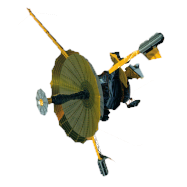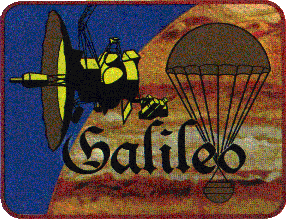GALILEO
Return to main
Galileo Table of Contents Page.
The Galileo Energetic Particles Detector
Galileo EPD Handbook
Appendices
Appendix B. SEDR Files (continued)
Source: J. F. Schmidling, JPL 625-610, SIS 224-09, Phase 2 Rev., 6/21/85
4. Detailed Interface Specifications (continued)
Table 3. SEDR IC Data Block Specification



 |
Figure 7. SEDR IC Data Block Ecliptic State Vectors. Note: All vectors indicate the state (position and velocity) of the object at the vector arrow with respect to the object at the vector source in the Earth Mean Ecliptic of 1950.0 (ECL50) coordinate system. |
 |
Figure 8. SEDR IC Data Block Ranges and Angles |
 |
Figure 9. SEDR IC Data Block Earth Centered Angles. Note: All vectors indicate right ascension and declination angles of the object at the vector arrow with respect to the Earth in the Earth Mean Equinox and Equator of 1950.0 (EME50) reference system. |
 |
Figure 10. SEDR IC Data Block Jupiter Centered Angles. Note: Each vector indicates right ascension and declination of the object at the vector arrow with respect to the center of Jupiter in the Jupiter True Equinox and Equator of Date reference system. The line segments indicate the longitude of the object with respect to the Jupiter System III reference system. |
 |
Figure 11. SEDR
Data Block Sun Centered Angles. Note: Each vector
indicates the latitudes, longitudes or right
ascension, declination of the object at the vector
arrow with respect to the center of the Sun in the
following coordinate systems:
|
Return to Galileo EPD Handbook Table of Contents Page.
Return to main
Galileo Table of Contents Page.
Return to Fundamental
Technologies Home Page.
Updated 8/23/19, Cameron Crane
QUICK FACTS
Manufacturer: The Galileo Spacecraft
was manufactured by the Jet Propulsion Laboratory,
Messerschmitt-Bölkow-Blohm, General Electric, and the
Hughes Aircraft Company.
Mission Duration: Galileo was planned to have a mission duration of around 8 years, but was kept in operation for 13 years, 11 months, and 3 days, until it was destroyed in a controlled impact with Jupiter on September 21, 2003.
Destination: Galileo's destination was Jupiter and its moons, which it orbitted for 7 years, 9 months, and 13 days.
Mission Duration: Galileo was planned to have a mission duration of around 8 years, but was kept in operation for 13 years, 11 months, and 3 days, until it was destroyed in a controlled impact with Jupiter on September 21, 2003.
Destination: Galileo's destination was Jupiter and its moons, which it orbitted for 7 years, 9 months, and 13 days.



